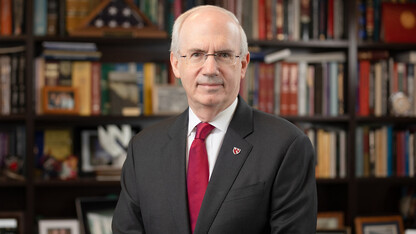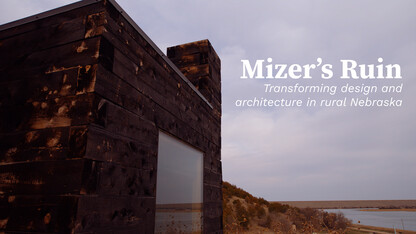· 4 min read
Chancellor listens, outlines steps to expand sexual misconduct services, resources

In an appearance before the Association of Students of the University of Nebraska, Chancellor Ronnie Green outlined a series of immediate steps in the University of Nebraska–Lincoln’s ongoing work to better support victims of and protect the campus community from incidents of sexual misconduct.
The university will expand victim resources, strengthen mandatory sexual misconduct training for the entire campus community, and increase faculty engagement on the issue.
“Over the last week and more, I’ve heard what our students have to say,” Green said. “I’ve heard the loud voices, demanding change. And, I’ve heard the quiet ones too, those who reach out individually and share their pain.
“I hate sexual assault, period. Know that I’m as committed as you are to helping us prevent sexual assault on our campus.”
Seven specific measures announced by Green during the ASUN meeting include:
Doubling the number of CARE advocates, which are professionally trained employees who support victims/survivors and help them navigate campus and community resources. The advocates — which will expand from two current positions to four — are part of the university’s Center for Advocacy, Response and Education (CARE).
Increasing support for CARE to help advocates focus on helping victims and developing contacts with outside resources, including Voices of Hope.
Creating a director of education on sexual assault within CARE. The position will be responsible for developing and implementing education and training programs for the university community.
Repurposing Neihardt Hall into a one-stop resource that includes new, more accessible facilities for CARE, Women’s Center and LGBTQA+ Center.
Examining an expansion of mental health supports on campus, including resources for Counseling and Psychological Services.
Addressing student concerns regarding existing sexual misconduct training and implementing a new plan by fall 2022. Green said the trainings will be mandatory and include bystander training and affirmative consent details.
Working with the university’s Office of the Executive Vice Chancellor and Faculty Senate and developing a syllabus statement on sexual misconduct.
“These actions are just first steps based on what I’ve heard from students, faculty and staff,” Green said. “I am committed to doing more and to having an ongoing dialogue with students across our campus community.”
Green also participated in a question and answer session with ASUN senators and a reporter from the Daily Nebraskan. Topics ranged from the conversion of Neihardt Hall and the ongoing investigation into recent sexual assaults on campus, to what Green thought of recent protests led by university students.
“When I woke up and saw the protests, to be honest, I struggled with them personally,” Green said. “But, these protests are a good thing — your chance to be a tremendous force for change.
“I encourage all of you to use your voices and be the agents of change you want to see.”
At the end of the discussion, Green said he and other university leaders will continue to listen to those voices, tapping into them to seek ways to improve the university.
The measures announced Sept. 1 expand the university’s ongoing focus to improve education, training and policy that addresses sexual misconduct.
In 2019, Green launched the Campuswide Collaborative on Sexual Misconduct, a working group of students, faculty, staff and community members charged with helping to strengthen sexual misconduct-related policies and procedures. The collaborative released a report with 35 key recommendations in October 2020. To date, 15 of the recommendations have been met by the university, 17 are in progress, and the remaining three are under consideration.
Through the guidance of the collaborative, the university has implemented multiple policies and procedures related to sexual misconduct. Critical points met to date include:
Requiring annual sexual misconduct training across the campus community;
Promoting broadly the definition of affirmative consent; and
Offering expanded training for relevant Title IX employees.
The university is also moving forward with a needs assessment; developing a campus climate survey regarding sexual misconduct; developing an annual Title IX report; increasing promotion and visibility of campus resources; developing a clear overview on the various review processes of sexual misconduct reports; creating a permanent commission/committee on sexual misconduct; and including a university policy-focused group within the permanent commission/committee.
Additional university-led steps include developing Use Your Voice, an initiative that promotes campus resources, reporting options and a supportive climate; and building a dedicated sexual misconduct website.
“We have been working for several years to increase efforts to prevent sexual assault,” Green said. “We’ve announced additional steps tonight. But, full success will take all of us in this room and across our university.”







